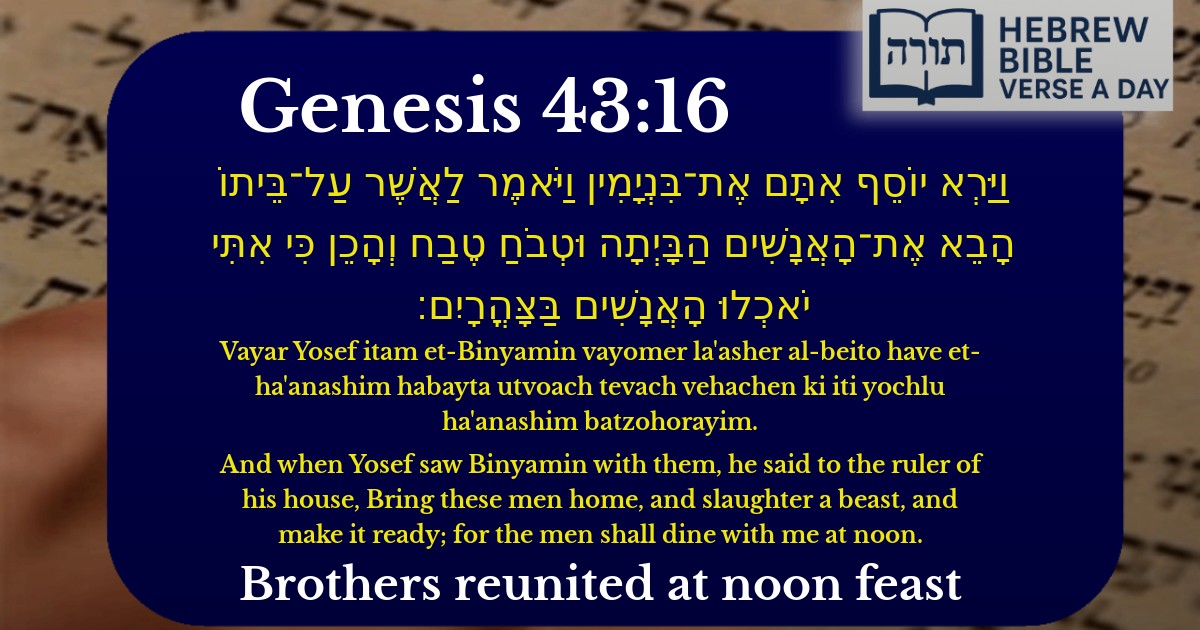Join Our Newsletter To Be Informed When New Videos Are Posted
Join the thousands of fellow Studends who rely on our videos to learn how to read the bible in Hebrew for free!
Hebrew Text
וַיַּרְא יוֹסֵף אִתָּם אֶת־בִּנְיָמִין וַיֹּאמֶר לַאֲשֶׁר עַל־בֵּיתוֹ הָבֵא אֶת־הָאֲנָשִׁים הַבָּיְתָה וּטְבֹחַ טֶבַח וְהָכֵן כִּי אִתִּי יֹאכְלוּ הָאֲנָשִׁים בַּצָּהֳרָיִם׃
English Translation
And when Yosef saw Binyamin with them, he said to the ruler of his house, Bring these men home, and slaughter a beast, and make it ready; for the men shall dine with me at noon.
Transliteration
Vayar Yosef itam et-Binyamin vayomer la'asher al-beito have et-ha'anashim habayta utvoach tevach vehachen ki iti yochlu ha'anashim batzohorayim.
Hebrew Leining Text
וַיַּ֨רְא יוֹסֵ֣ף אִתָּם֮ אֶת־בִּנְיָמִין֒ וַיֹּ֙אמֶר֙ לַֽאֲשֶׁ֣ר עַל־בֵּית֔וֹ הָבֵ֥א אֶת־הָאֲנָשִׁ֖ים הַבָּ֑יְתָה וּטְבֹ֤חַ טֶ֙בַח֙ וְהָכֵ֔ן כִּ֥י אִתִּ֛י יֹאכְל֥וּ הָאֲנָשִׁ֖ים בַּֽצׇּהֳרָֽיִם׃
וַיַּ֨רְא יוֹסֵ֣ף אִתָּם֮ אֶת־בִּנְיָמִין֒ וַיֹּ֙אמֶר֙ לַֽאֲשֶׁ֣ר עַל־בֵּית֔וֹ הָבֵ֥א אֶת־הָאֲנָשִׁ֖ים הַבָּ֑יְתָה וּטְבֹ֤חַ טֶ֙בַח֙ וְהָכֵ֔ן כִּ֥י אִתִּ֛י יֹאכְל֥וּ הָאֲנָשִׁ֖ים בַּֽצׇּהֳרָֽיִם׃
🎵 Listen to leining
Parasha Commentary
📚 Talmud Citations
This verse is not quoted in the Talmud.


Yosef's Recognition of Binyamin
The verse states, "וַיַּרְא יוֹסֵף אִתָּם אֶת־בִּנְיָמִין" ("And Yosef saw Binyamin with them"). Rashi explains that Yosef was moved to tears upon seeing his full brother, Binyamin, after many years of separation. The Midrash (Bereshit Rabbah 93:7) elaborates that Yosef inquired about Binyamin's well-being and examined him closely to see if he bore any resentment for Yosef's disappearance, but found none.
Invitation to a Meal
Yosef instructs his steward, "הָבֵא אֶת־הָאֲנָשִׁים הַבָּיְתָה" ("Bring these men home"). The Ramban notes that Yosef's hospitality reflects Avraham's trait of hachnasat orchim (welcoming guests), demonstrating that Yosef maintained the values of his forefathers despite his high position in Egypt. The phrase "וּטְבֹחַ טֶבַח" ("slaughter a beast") is interpreted by the Sforno as a sign of honor, indicating a festive meal prepared in their merit.
The Significance of Dining at Noon
The verse concludes, "כִּי אִתִּי יֹאכְלוּ הָאֲנָשִׁים בַּצָּהֳרָיִם" ("for the men shall dine with me at noon"). The Kli Yakar explains that eating at midday was unusual for Egyptian nobility, who typically dined in the evening. Yosef deliberately chose this time to avoid suspicion, as dining with foreigners at night might have raised questions. Additionally, the Ibn Ezra suggests that noon was a time when Yosef could privately converse with his brothers without interruption.
Spiritual Lessons